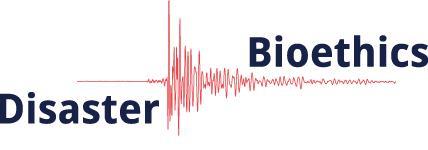Working Group 4: Ethics and governance
Working Group Chair: Ana Borovecki
Working Group Vice Chair: Henk ten Have
Full member list: Link (registered action members only)
Information about Working Group 4 (copied from MoU)
Ethics and governance are closely linked, especially in international policy and law. Governance addresses a broader range of issues, which includes ethics. Together, these promote good policies and high standards in disaster risk reduction and disaster risk management. Disaster preparedness and responses raise many ethical issues, such as vulnerability, susceptibility and community resilience, inequalities of disaster risks and impacts, accountability, balancing sustainability and development, and how people’s rights are respected. Planning involves priority setting which involves ethical decision-making. The UNISDR Hyogo Framework notes that policies for disaster preparedness must be implemented in an ethical fashion (http://unocha.romenaca.org/Portals/0/Docs/Disaster-Preparedness-for-Effective-Response[1].pdf). For example, UNISDR has identified vulnerability as a key principle in setting priorities. Some of the most vulnerable people during disasters are children in schools and patients in hospitals, which has made the planning and building of safe schools and hospitals a high priority (http://www.unisdr.org/we/campaign/schools-hospitals). This WG will examine the interplay of ethics and governance in setting such priorities and the standards by which initiatives will be measured.
WG4 will, like the others, begins with a systematic review of existing reports and policies in this area and identify specific issues which require further ethical analysis. STSMs will be developed to allow focused, in-depth investigations into specific issues. Having international organisations in the Action will facilitate the identification of issues requiring analysis, and provide an avenue by which conclusions and recommendations from the Action can be brought to the attention of policy-makers.
Such work fulfils one of the requirements identified in the Chair’s Summary from the May 2011 Global Platform for Disaster Risk Reduction. According to this, political entities should: ‘Actively engage and support scientific and technical communities to inform decision-making.’ (http://www.unisdr.org/we/inform/publications/19947). In other words, policy-makers at the highest levels will benefit from the type of outputs this Action will provide.
